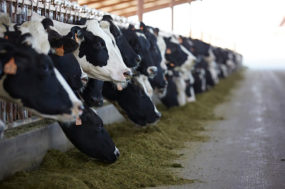Researchers met the kids again as teenagers. What do you think happened? Those who waited turned out to be better in various ways: They got better marks, ‘were less prone to impulsive behaviour’ and, according to tests, were ‘more likely’ to be well-adjusted.
After the marshmallow test came a deluge of other, similar tests with similar results. Patient children don’t often become impulsive teenagers. Which means they don’t often turn into fat teenagers or drug-addicted teenagers,” wrote William Leith in a July 24, 2012, article in The Daily Telegraph.
This famous study was crafted into a best-seller book by Joachim de Posada, Don’t Eat the Marshmallow, and explained by de Posada in a Ted.com video.
My concern is this: The next generation is hard-wired to have things happen instantly via texting, e-mails, microwaves, drive-thrus, etc. Frank Partnoy, the author of Wait, agrees with me.
How does this impact farm families?
1. We wait for a harvest because we know that the seed, soil and weather conditions all need to align to produce a great crop. Younger farmers are stressed about the price of the land that crop is on. They don’t know if they should jump into more risk and debt or be patient renting most of their land.
2. We wait for land prices to rise, so we can cash in when we are old. Well, what does greed have to do with this? Do you have more than enough already?
Why are you making the next generation wait to have their own equity when you as a founder or wealthy landlord have more than enough for your own coffers?
Would it not be a wonderful thing to help get the next generation started on building their own equity? Could you be thankful and content for “having enough?”
3. We wait for people to grow up. Due to the “instant” and self-indulged nature of youth, I am concerned that some successors are not showing up as adult business partners to the farm vision table.
“When is he ever going to grow up and act like a calm, rational adult rather than exploding and leaving the conversation?” I’ve mentioned before that one of the weaknesses of young farmers is their inability to do conflict resolution well because they have never had to win their own battles.
Mom and Dad have covered for them. It’s time for everyone on your farm team to show up as an adult, with collaborative skills to find win-win solutions for all. Check out “How to have better family fights."
4. We wait for disposable income to buy the “fun stuff.” My 1981 story of being a new bride with wooden Coke box end tables in my home gets old pretty fast with the next generation, whose homes from the start look as good as their parents’ homes. I am not criticizing the need or want for beauty and nice things.
But I am curious about the mechanical toys that are in the shop when the next generation is stressed about paying down long-term debts. Those who can wait don’t expect to “have it all at once.” I know farmers need to have more fun in their lives, just at what expense?
5. We wait for the founders to make a decision to sign us on as shareholders. This waiting creates huge stress and anxiety when the future is uncertain. I just spoke to a 56-year-old who owns nothing while his 80-something father hangs on tight to land and threatens to join his titles to a non-farming child. That stinks.
Sometimes people wait too long to take action on a situation that is hopeless. How do you know? Past performance is a pretty good indication of future behaviour. This is the reason why another young couple I coached has decided to leave the farm and invest in a different career.
They were tired of waiting for the choices of the founders to change to accept them as the successors. They moved on and decided to preserve some family relationship.
6. We wait for the “experts” to tell us what to do. Really? Coaching is about helping farm families discover what kind of farm they want and the way they relate as business partners and happy family team members.
Paul Hammerton, of MNP’s Swift Current office, and his colleague Janet Moen have software called FarmHand.
This is an amazing program to help farmers make better informed financial decisions using all of the farmer’s own data to reflect back to the farmer what his costs of production are for each crop and ratios like debt to equity and a host of others.
Paul and Janet often have to wait for all of the data to be collected properly so the best decisions can be evoked from the software.
The expertise advisers can provide is sometimes frustrated by the inability of the people to wait for all of the data to be processed. Good decisions require good input and thought. Thinking takes time when you are assessing different scenarios and outcomes.
Do good things come to those who wait? Yes, I think so. I was the kid who could leave the marshmallow on the table. As a coach, I am saddened by the grief of the family with successors who do not understand the value of being able to wait.
What can you do this fall to make your waiting time more productive and less stressful? Count your blessings and celebrate a real thankful Thanksgiving.
But they that wait upon the Lord shall renew their strength; they shall mount up with wings as eagles; they shall run, and not be weary; and they shall walk, and not faint.
—Isaiah 40:31 PD
Elaine Froese, CAFA, is a member of the Canadian Association of Farm Advisers. Her book Do the Tough Things Right helps families make decisions to reduce their communication stress. Book her to speak at your next ag group event at (866) 848-8311 or at her website.









